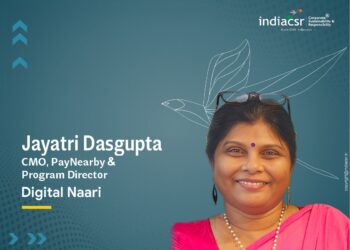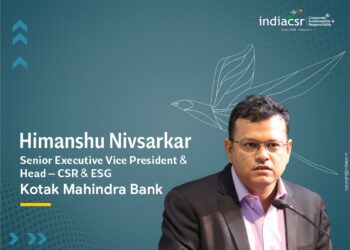Schneider Electric India has planned certain milestones that the company intends to reach by 2025. Globally, Schneider Electric will provide training to 10 lakh young people and incubate 10,000 entrepreneurs by 2025. In India, the company aims to create 3 lakh skilled energy professionals and 3,000 energy entrepreneurs for which it has chalked out an ecosystem of apex vocational training bodies, credible NGOs, and Government technical institutes.
Venkat Garimella, Vice President- Corporate Strategy -Sustainability and CSR, Schneider Electric India sharing CSR and Sustainability Journey with India CSR. Excerpts of an interview:
At Schneider Electric, you talk about ‘Access to Energy’ being a basic human right. How do you plan to improve people’s quality of life through universal energy access?
Access to energy is a fundamental human right and we want everyone on the planet to have access to reliable, safe, efficient, and sustainable energy. With this overarching vision, we are running several programs that are aligned to realize this vision by empowering the people from financially disadvantaged backgrounds, both in the rural and urban milieu, for inclusive growth. Energy access does not limit to enabling basic energy access. It traverses across multiple initiatives under the 6E’s- from vocational skill development training the unemployed and youth employed in the informal sector as professionals in the field of electrical and solar energy to restoring electricity in times of disasters. While Enabling access to energy to the community, we not only look into community electrification- we also look into strengthening livelihoods of people through the ‘Energy for sustainable livelihoods’ initiative where we ensure food security, decarbonize agriculture, reduce migration and enhance income for farmers through multi-cropping with the help of solar-powered irrigation pump sand into building a sustainable future with Smita program- where we set up digital classrooms in rural schools, again, powered by solar energy.
How was the year gone by for Schneider Electric in terms of CSR? Can you talk about a few initiatives taken by the company that made a difference in society?
The Schneider Electric India Foundation (SEIF) is committed to contributing to society at large by way of socio-economic development while having environmental, social and economic sustainability at the core of all our programs. SELF has been instrumental in supporting the vocational training of more than 14,000 unemployed youth and incubating 85 entrepreneurs to establish their businesses. This year, in partnership with credible implementation partners, 57 new electrical and solar training centres were established across the country. Further, in an attempt to address the skill gap in the data center segment, we established in partnership with STT Global Data Centres, a Centre of Excellence to provide skill training for entry-level professionals in the Data Centre Industry. Under Our Energy for Sustainable Livelihoods program, about 2.500 farmers were supported with solar-powered irrigation pumps to switch from monocropping to multi-cropping thus reducing migration and decarbonizing agriculture.
How do you empower women through CSR initiatives?
‘Women empowerment is a goal the whole world is trying to achieve; we are taking our steps too. Our initiatives have a special focus on women, to do our bit for the cause. We have created about 5000 women community leaders through our Energy for Sustainable Livelihoods initiative where women farmers are at the forefront in ensuring community engagement, sustainability and operationality of the project. We Have also trained more than 5200 women as solar and electrical energy professionals, which is believed to be a male-dominated sector. As per our impact assessment, these women credit the course for enabling the option of a career in place of marriage for them. Also, as a part of our 2025 goals, we aim to benefit 50% of girl students through digital classrooms in rural schools, thus reducing the digital dividend while sensitizing them to environment and energy conservation. As part of your CSR, you have institutionalized various Vocational Training Centres.
What are your goals for the coming years?
Skills And knowledge are the driving force for the economic growth and social development of any country. Accordingly, a large, skilled workforce is needed for any growing economy, including India. Through our skills training initiatives, we intend to offer training and enhance the development capacity of the youth and women from economically weaker sections. The goal is to empower them to gain access to opportunities for sustainable livelihood and growth. Towards this goal, we began our Electrician Training in 2009, a flagship Skill Building Programme that focuses on hands-on practical training. Aligned with the Government of India’s Skill India Mission, our vocational skill development program aims to enhance the employability of school and college dropouts to create a pool of trained professionals for the energy domain. The program is executed via a sustainable partnership model to ensure longevity and sustainability of the program, targeting 360-degree development of the trainees via classroom program, hands-on training, job fairs and interaction with industry stalwarts and emerging entrepreneurs.
Currently, our electrician training programme is available in 328 centers across the length and breadth of India, including 25 aspirational districts, disturbedareas, and difficult terrains like Bastar, Raygada, Ladakh. Since its inception, more than 1.48 Lakh unemployed youth have been trained as energy, which includes more than 5200 women. We Have planned certain milestones that we intend to reach by 2025. Globally, Schneider Electric is committed to training 10 lakh young people and incubating 10,000 entrepreneurs by 2025. In India, we aim to create 3 lakh skilled energy professionals and 3,000 energy entrepreneurs- for which we have chalked out an ecosystem of apex vocational training bodies, credible NGOs, and Government technical institutes.
In your opinion, how can CSR contribute to an Atmanirbhar Bharat?
As Atmanirbhar Bharat or a self-reliant India becomes a nationwide mission, it’s important to note that one-third of the country’s population comprises the youth between 10 and 24 years of age. To leverage this demographic dividend, we must focus on their welfare. We are enabling ‘Atmanirbharta’ among our beneficiaries through enhanced employability for skilled youth; food security and increased sources of income through multi-cropping for farmers and introducing updated learning skills to students through digital classrooms. Encouraged By the achievements of the skill development initiative, we are going further by providing informal entrepreneurs and those trained in the electricity sector and aspiring to start their own business with support in setting up their businesses through skills training and business start-up support. About 1000 candidates have been incubated as Energy Entrepreneurs to date. Once their businesses are established, these entrepreneurs come forward to employ our trainees post their course completion- which shows their self-reliance in the true sense. These people can change not only their own lives but also the direction of their communities, making a contribution to the development of their countries by bringing in new energy solutions that are safe, reliable and sustainable.
(India CSR)





















